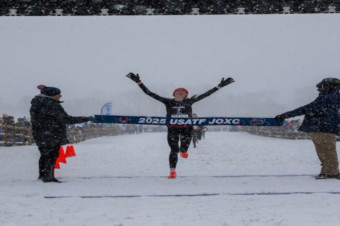Grind House
Outdoor May 3, 2012 SportStars 0
Rocklin’s Epic Skatepark has become a sanctuary for casual skaters, and starting point to the slightly more serious.
By JIM McCUE | SportStars
Skate to live. Live to skate.
That sentiment and attitude has been around since urethane wheels created the skateboarding boom of the 1970s, and it lives on today at the Epic Indoor Skatepark in Rocklin.
The 36,500-square-foot facility provides a place for skateboarders, scooter and BMX riders to practice, learn, or just hang with friends. The park is one of a rare skateparks in the Sacramento area, drawing recreational riders and aspiring professionals to its ramps, rails, stairs, and bowl.
“The majority of people who use the park are kids ages 10 to 21,” said Keith Halterman, who manages the park and Epic’s competitive skateboarding team. “That’s our core group, but we get younger kids that like to ride their scooters in parts of the park and older riders including some ex-pros. There’s really a diverse range of people that use the park.”
Epic, which opened in 2009, hosts mostly open sessions for skateboards, inline skates, and scooters. However, it also has special sessions for BMX riders, welcomes school field trips, and hosts birthday parties. Private and group lessons are also offered as are skateboard and scooter camps.
“Scooters make up a big part of our income,” Halterman said. “It is relatively new as a sport, but without them, we are not in business for the skaters to come here and train and skate. We would have closed a year and a half ago if not for the scooter riders.”
While the scooter crowd may have to work harder to gain the respect of the skateboarders (think early skiers vs. snowboarders issues), it is slowly gaining acceptance in the skating community. The Epic Skateboard Team, which has been in existence since the park opened, recently added a scooter team with three riders that have their own team manager to help coordinate entrance and travel to competitions.
Halterman, who still competes professionally, oversees Epic’s team of sponsored skaters ranging from 12 to 18 years old.
“I don’t necessarily have one role as a team manager,” Halterman said. “Sometimes they need help with school, sometimes they need advice on girls, for someone to be like an older brother, or just to listen.
“Sometimes they need help with certain tricks, but I see my main job as an overall mentor to these kids. I try to show them what it takes to be in the industry, guide their attitudes to become a pro, and how to market themselves.”
Halterman’s marketing concepts are not textbook or overly elaborate. Often, the key to marketing young sponsored riders is to focus primarily on attitude. Halterman, 28, has seen successes and failures in skateboard marketing where the best riders may not be the most popular or the ones with their names on the most boards or apparel.
“If you look at the guys that are big in the sport, like a Tony Hawk, they are personable and put a good image out to the public,” he said. “Kids and parents don’t want to support someone with a bad attitude and buy stuff with their name on it. Parents are watching, so I work with the kids on presenting themselves in the best light possible. You are 100 percent the product.”
Part of that marketing is how team members act while inside the skatepark where Halterman can observe interactions between teammates and other riders, but all team members must sign a contract that requires that they maintain good grades and conduct themselves properly in school and in public. Breach of that contract can result in the skater losing their spot on the team and Epic sponsorship.
“All of the kids on the team do well in school, and I think that it is important for us to keep our grades up to stay on the team,” said Brent Bell, a 17-year-old from Lincoln who attended Lincoln High before starting his senior year being home-schooled through the Horizon Charter School. “A lot of doors have opened for me because of skating, and I’m just very blessed to be where I am now.”
Bell is one of a handful of older riders on the Epic team that Halterman believes have professional potential beyond the circuit of regional events Epic hosts and participates in. Some of them have other sponsorships outside of Epic and hope to follow in the footsteps of pros who have used or visited Epic, such as Nyjah Huston, the youngest ever X Games competitor at age 11.
Bell, who has visited Huston in Los Angeles and seen the bright side of professional skateboarding, would welcome the chance to turn pro, but takes the skater’s c’est la vie attitude.
“My main goal is to have fun at it and see what the outcome is,” he said. “It would be cool if I could go pro, but I (skate) because I love it. It is a passion for me.”
Other potential stars on the Epic team — James Gray (17), Blake Swain (15), Jeremy Vogt (18), and Dylan Hilton (18) — all responded with the same thoughts on training and working solely to become a pro with multiple sponsorships. Fame, wealth, and recognition take a back seat to doing what they love to do.
“I just want to have fun and skate,” said Swain. “When I was younger, I always wanted to be some big, pro skater, but I just want to skate. I don’t care if I go pro because I am happy skating.”
Part of the allure of skating is the common love for the sport and the acceptance of all comers regardless of culture, status, or looks. The uniting characteristic for all comers, pro or otherwise, to Epic is the love for skating.
“Even the best pros just love to skate,” Halterman said. “Sure they are excited to get the chance to get paid to do something they love, but it all comes back to the fact that these guys would skate no matter what. That’s their attitude. They only care about skating.”
When the Epic team is not practicing, they hit the road during the summer months to compete around Northern California and beyond. One of the main competitions is the Northern California Best Amateur Skateboard Series (BASS). This year’s series will have seven stops, including three at Epic and contests in Benicia, Marina, Grass Valley, and Turlock.
As the host of numerous competitions, Epic provides the ideal training facility for the team, allowing for practice on layouts that will be used in the contests.
“(Epic) is the best place you want to be if you are preparing for a competition,” said Vogt, who lives nearby in Roseville. “You can set up areas in the park, so that you are basically going over the routine that you will do at a competition elsewhere. Everything is here to train and get ready.”
Potential pros like Vogt and Hilton, who makes the trip to Rocklin from Oroville, can also train at Epic for the street riding that most of the team members enjoy. Team members and Epic’s own videographer often hit the road to get footage needed for the videos that can attract big-name sponsors like Bones, Independent, and others. Hilton has been gathering footage of himself for nearly two years to be part of an extended video that he hopes might bring the attention he needs to find his name on boards, hats, or shirts in the future.
“I skate all the time and most of the time it’s here,” Hilton said. “It’s better than doing something that could get you in trouble, and it keeps me active. But I’m just having fun with what I’m doing now. If something happens with the video that I am working on, I will take the chance to see where it goes.
“But I’m fine with whatever happens — if I can just skate.”
SportStars
SportStars Magazine: High School Sports Articles Online SportStars is your go-to source for the very best high school sports articles in California. Player and team profiles, game coverage, health and fitness tips and the largest Camps, Clinics & Combine resource for athletes. We're the story behind the stats.









No comments so far.
Be first to leave comment below.